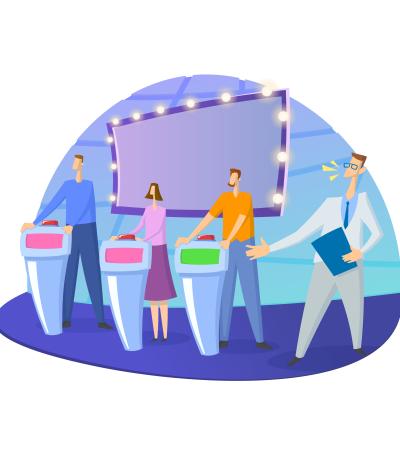COVID-19 isn't just a health crisis; for many Americans, the pandemic has caused economic turmoil as well. As members of ALA's Financial Literacy Interest Group, we know the importance of financial capability skills, and this was a moment for us to step up.
So facing statewide "shelter at home" orders this spring, public and academic libraries made a quick shift to online financial literacy programming. Here’s what we learned along the way.
Carpe diem!
Plano Public Library regularly offers in-person financial education for all ages and was scheduled to host the Thinking Money for Kids traveling exhibition in April 2020. With libraries closed to the public starting in mid-March, they seized the day and put their video skills to use making the pivot to virtual programming. Pre-virtual programming, their financial education included: (1) an interactive program called Art Shop in which kids use play money to purchase supplies for making a masterpiece; and (2) a game for teens to choose a career and lifestyle choices, then see how far their paycheck could stretch; and (3) a presentation for adults that covers basic financial terms and concepts.
While staff are still looking for ways to recreate Art Shop virtually, both the teen and adult programs have transitioned beautifully and are being held using Zoom with great attendance! Additions to the program roster have included Budgeting for College, Basic Budgets Using Excel, and Protect Yourself Against Fraud (partner with AARP).
Academic libraries like Penn State Harrisburg faced challenges working with expert presenters from outside their libraries. Non-university personnel were no longer allowed on campus during the remote instruction period, and in some cases did not have clearance to present virtually from their organizations. Promoting online resources, like financial literacy ebooks and LibGuides, helped fill the gap for canceled sessions.
Entering the virtual world is taking flexibility and creativity, and we’re making it work!

Think broadly about financial topics
Remember that financial literacy encompasses a wide variety of elements. From earning to budgeting, saving, comparative shopping, money-saving tips, retirement planning, benefits management (Social Security, Medicare, insurance), investments, credit scores, banking resources and more ... just find a place and jump in!
Financial literacy topics have a heightened importance to many library users during the pandemic, especially if they are facing a job loss or reduced income. Trustworthy financial literacy information sources like the Consumer Protection Financial Bureau and the FINRA Investor Education Foundation have added content that addresses these concerns and provides information to help those who recently found themselves in challenging financial circumstances.
While not every topic is a simple fit for digital presentation, adult programs are most adaptable since they typically are delivered lecture- or instruction-style. The virtual environment can add some additional creativity to online sessions by combining multiple skills: a workshop on using Excel to create a simple budget builds both technology skills and financial capability, and it can be recorded for the patron to watch on demand as needed.
Consider the technology know-how and internet access of your intended audience
Seniors may be less confident with technology, but partnering with organizations they know helps connect them with programming (e.g. AARP); teens are tech-savvy and are likely to respond to online classes relating to college and preparing for adulthood.
For less tech-savvy audiences, prepare adequate staff availability to assist with technology issues and be sure participants know they can call in to your virtual session instead of using a computer. For teen programs, consider partnering with a college or university, and provide participants with virtual handouts and links to library resources as a way to find more information.
To meet the needs of our audience further, Plano Public Library workshops are recorded live and added to the library’s YouTube channel for later viewing. This recording is also included in a recap on the library’s blog, along with additional learning resources from the library’s collection. Penn State Harrisburg will record and share their literacy sessions to a First Year Seminar group after each workshop this fall for those who can’t attend live.
Link participants to library resources
Be prepared with a list of library resources for personal finance: databases, ebooks, recordings of previous online workshops, digital magazines or print materials covering financial literacy topics. Connect the virtual program audience back to the library to extend the learning process and promote your available resources and services, whether online or material.
Be sure to place the same information on your library website and share through newsletters or blog for extended reach. Examples include: emagazines like Kiplinger’s Personal Finance or Consumer Reports and databases like Morningstar or Value Line for investment research. There are several finance-related Great Courses, too!
Limited internet access? Prepare packs of resources from the library’s handout collection, partner organizations resources and a list of financial literacy book recommendations for those who might not have access to a computer or stable internet.
Bring in partners for added expertise
Involving partners can broaden your capacity and provide a deeper dive into financial topics. Let financial experts share their knowledge while library staff show patrons how to access and utilize informational resources and tools for money management. Be sure to set expectations with your partner presenter: what information they will provide, and how the session will be managed. Do a run-through of the virtual event beforehand to build familiarity with the virtual environment and assign responsibilities, such as capturing audience questions and troubleshooting participant technology.
Know who can and can’t deliver programs online. Over the past couple years, the Federal Reserve Bank has provided training for library staff using their educational resources for adults and teens. This has equipped staff to present these resources in person, and now virtually. In Plano, additional online programs are facilitated by the Area Agency on Aging (Medicare 101), and college student money management centers, which provide financial education programs for teens. Each agency may have restrictions on what software can be used and what information can be shared online. Be sure to ask about these restrictions before planning events.
Provide what your community wants
Use a post-program survey to find out what your library patrons want to learn. Ask questions about what they gained from your virtual program and what other topics are of interest to them. Provide a list of topics you know your staff or local partners can present, including financial and technology topics such as budgeting, developing budgets in Excel, retirement planning and investment resources, strategies for saving, or apps for tracking expenditures. This will help you identify partners with specific skillsets to provide this content.
At Plano Public Library, virtual programs have been a major hit; attendance for teen and adult workshops is double or triple what they typically see in-person. They include a post-event survey with each workshop and have uncovered interest in building skills with Excel and other technologies, exploring ancestry, and resources for financial success from teens through retirement, which will be great topics for future sessions.
Penn State Harrisburg saw a decrease in student participation for virtual events in the spring, immediately following the pivot to remote. Students may have been overwhelmed by all the changes, and uninterested in taking on more tasks or events. Registration for fall programs is high, and they are looking forward to working with students on important life skills in a new environment.
Beware of “Zoom Fatigue”
As Penn State Harrisburg experienced, not all virtual events may be welcome, depending on other life stressors. Your users might spend all day in front of video-conferencing services, for work or for school. Perhaps they are tired of being on camera, and do not want to participate in additional live events online. Be sure to provide access to recordings or self-paced tutorials for this group to use when they have the energy to engage.
Do what you can
Not all solutions will work for every user. Try to get as much feedback as possible about the types of things patrons have questions about and what they think will be the most effective way for them to learn about this topic.
It appears that in-person gatherings could be off the table for a while longer. Be creative, and we know your users will appreciate what you can do.




